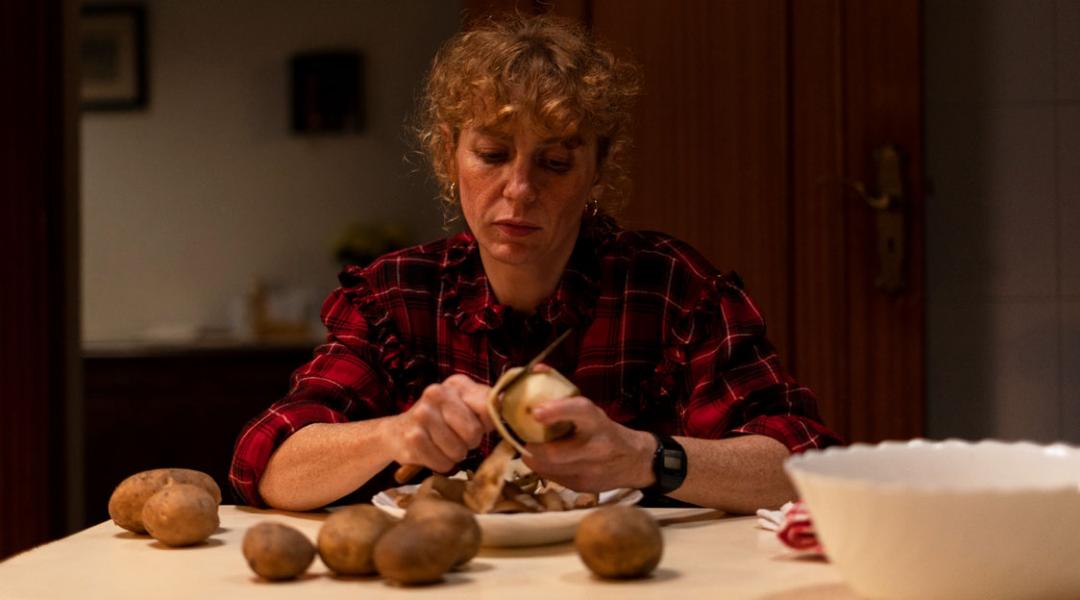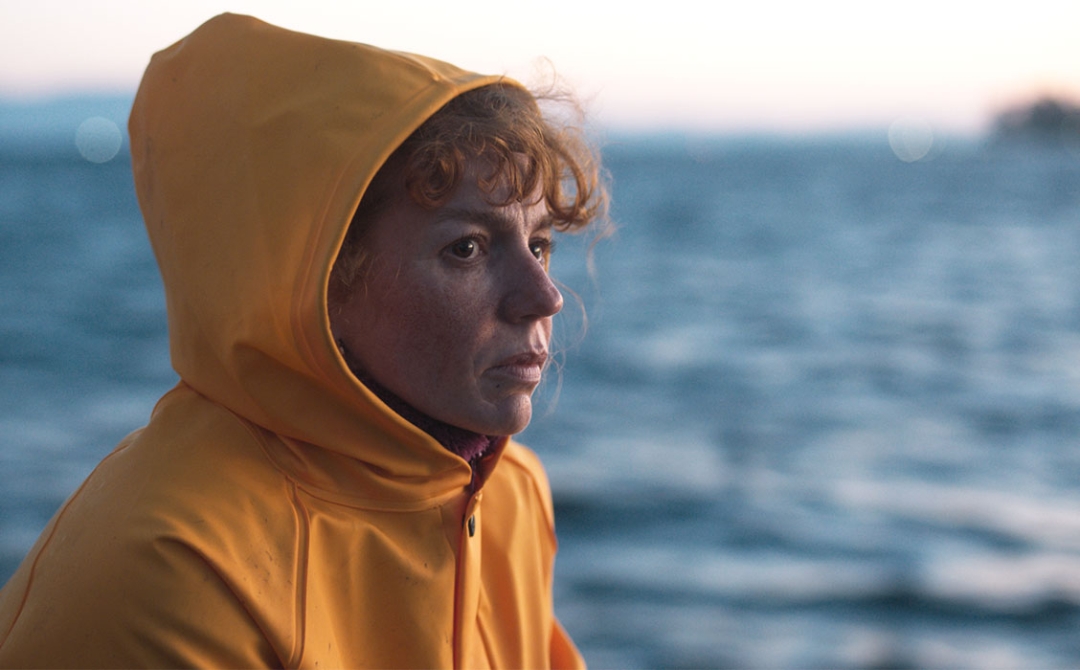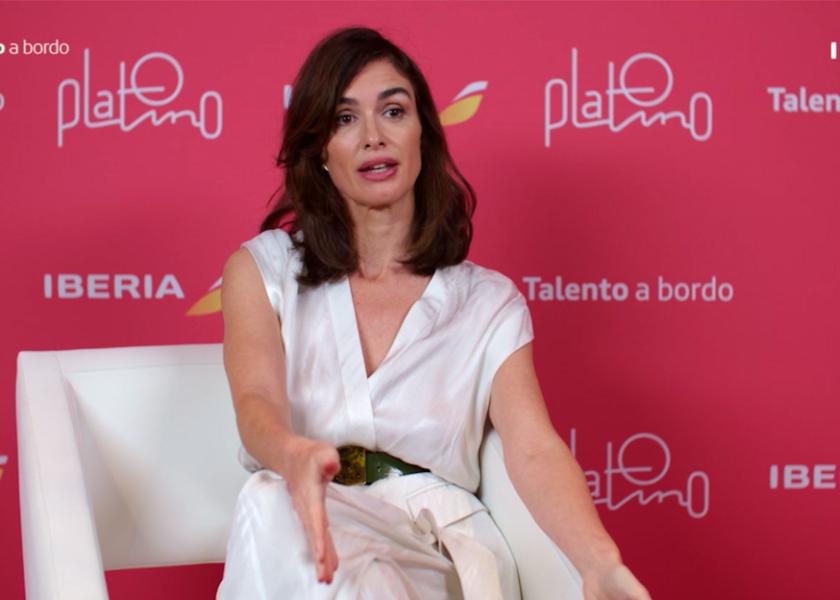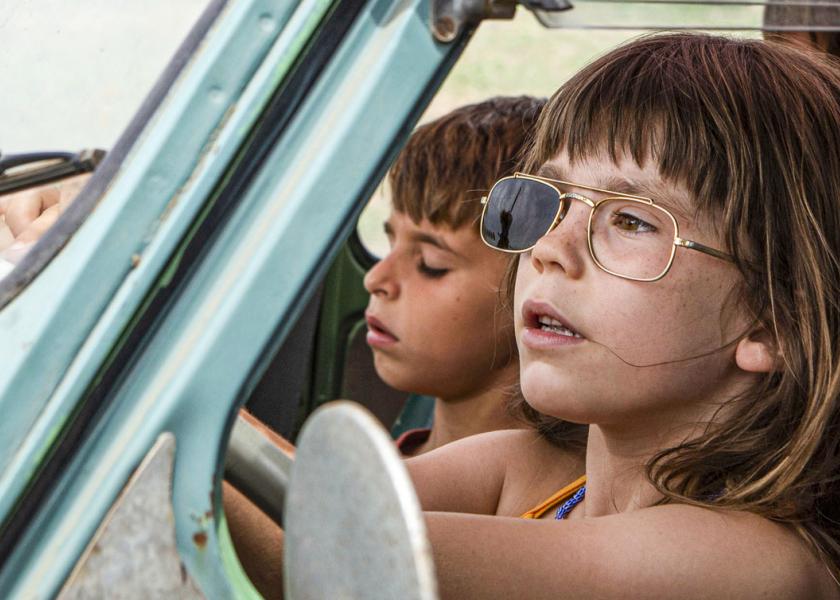María Vázquez
Labourer of acting

Álvaro Gago, the director of ‘Matria’, chases Ramona with his camera in a frenzied story that has earnt María Vázquez her second Goya nomination. This Galician actress is having a moment professionally but is keeping her feet firmly on the ground because, just like her character, a hard-working woman, she’s aware of the job insecurity in her sector.
“I always say that, sometimes, those who make it aren’t the ones who do the best job, but rather the ones who resist the best.” This is what María Vázquez (Vigo, 1979) responds to the question of whether acting is a long-distance race. After acting for 25 years, this nominee for the Goya Award for Best Actress for her work in Matria, has been congratulated for her role as Ramona since the film was released at the 2023 Berlin International Film Festival, including the Golden Biznaga at the Málaga Film Festival. María defines herself as "a labourer of acting" and knows that the key to talent lies in hard work: “True talent lies in discovering what yours is and growing it. The error lies in believing that, just because you’re talented, you don’t need to work hard.” Her Ramona knows a lot about hard work, a woman who’s a victim of insecurity that María has endowed with overwhelming strength, character, and honesty.
Just a few days before the Goya Awards, would you say that Ramona is the most important character in your career?
Up until now, yes. Ramona has given me a lot of professional but also personal joy. A friend tells me that I can’t ask this character for much more, so, whether I receive a Goya or not, I’ll be happy. Shooting Matria was wonderful, it allowed me to discover other realities and an incredible group of women. It kept my feet firmly on the ground. I’m really grateful to Álvaro and Francisca [Iglesias Bouzón], the person the character is based on.
The level in the category of best actress is sky high. How much talent is there in the work of your rivals?
I’ve seen their acting and I can confirm that there’s so much talent. Also, other actresses with great work have been left out of these nominations. I like to say that we’re allies, rather than rivals, because one woman’s success is success for all of us. My colleagues are role models, a supportive safety net, so whoever wins will be a joy.
“Shooting ‘Matria' was wonderful, it allowed me to discover other realities and an incredible group of women”
To prepare for the role of Ramona, you worked in a cannery and enrolled on a mussel farming boat. Was it necessary for the character?
100%. In the film, I interact with real people —many weren’t professional actors— and I felt that, for it to be believable, everything I did had to be as realistic as possible. It was a fully immersive job. There are many ways of playing characters, but I like to work on them a lot. I was lucky because Álvaro gave me time and confidence, which doesn’t always happen. Ours is a slowly crafted creative process. I love Matria because I consider myself a labourer of acting and it questions me directly.
As you were saying before, your character is inspired by a real woman. Apart from Francisca, which other women inspired you?
As well as Francis, I was inspired by the women at the cannery. Also, those I crossed paths with at Illa de Arousa and in Vilagarcia de Arousa for the three months I spent there preparing the character. I spoke to them a lot because I’m from another area of Galicia and needed to learn their accent. Someone who’s had a big impact on this and other works is my grandmother on my mother’s side, Plácida. She was a strong woman who loved her land and her culture.

In ‘Matria’, María Vázquez plays Ramona, a woman who fights to survive in the estuary area of Arousa. © Avalon
Insecurity is part of Ramona’s everyday life, something that also affects film professionals. How much uncertainty is swept under the red carpet?
If only around 7% of the profession makes their living of this, imagine how uncertain it is. In the end, only the privileged step onto the red carpet. It’s obvious that they are part of the industry and that’s not bad in and of itself, but at the same time it feels controversial to me because I believe we should dignify our profession more, because some people suffer a lot despite having work. Sometimes we only show the beautiful side, and we also need to defend, for example, the new Statute of the Artist.
Ramona speaks Galician. In recent years, Spanish film is raising awareness of more languages and accents. How important is showing this diversity?
It’s important because it enriches us. We’re lucky to have this much diversity in this country and we need to show it because it opens people’s minds. For many years, films have shown a reality that has been more reflective of the centre of the country than the rest. Slowly, film and TV are raising more awareness of that diversity, but we still have a long way to go.
“I consider myself privileged because I have many actress friends my age who are suffering. I can’t think that the world revolves around me”
The end of Matria leaves us wanting to know how it’ll go for Ramona. What would you like her future to look like?
Despite the hopeful ending, I think Ramona’s going to have a tough time. As a society, we’re still missing support networks for these kinds of women. We need to raise awareness of them and realise what they need. I’d love for her to do well; I wish she’d learn to be alone and start to value herself more.
Your sister, Tatiana Rodríguez, is a screenwriter; you’re an actress. Where does your artistic side come from?
And my older sister is a restorer! When I told my father I wanted to be an actress, he said: “Not a single normal daughter!” I’ll always remember (laughs). I don’t know, but it’s true that, even though my parents had different kinds of jobs, they’re very artistic. We’ve always been quite a crazy family. At home we loved to dress up and put on shows. Also, my father used to paint, and my grandmother recited poems.
At the tender age of 18, you came to Madrid to study dance, but discovered that acting was your true passion. How do you remember that process?
Looking back, I always loved acting. There were no acting classes where I lived, so I signed up to ballet, but I used to just pass in technique and excel in expression. When I landed in Madrid, I realised that I liked acting more, I felt that it allowed me to express myself more. I progressively stopped dancing and started acting, I got into Estudio Corazza and there was no going back, acting became my passion and my profession.
“As time goes by, you realise that what you want is to work with good people. Also, they’re usually the best professionals”
When an actress surpasses a certain age, it’s usually harder for them to get roles. You, however, never stop working. Do you think this situation is changing?
I believe things are slowly changing. I consider myself privileged because I have many actress friends my age who are suffering. I can’t think that the world revolves around me. I’m really grateful, but I also keep my feet firmly on the ground and I’m scared that this might be an oasis in the middle of the desert. In the meantime, I want to enjoy myself and work as hard as I can.
If 2023 has been good, 2024 is looking promising. What other projects are in your future?
On the 8th of March, we’ll release Celia Rico’s second film (Los pequeños amores), where I star alongside Adriana Ozores. Celia is incredible as a director and as a person. As time goes by, you realise that what you want is to work with good people. Also, they’re usually the best professionals. I also have a new film with Pau Freixas, Alumbramiento, about stolen babies, and the second part of Cuñados [+Cuñados]. I finished shooting Nosotros, by Helena Taberna, not long ago and now I’m going to start filming a Netflix series called Jardinero. I’m really happy!


